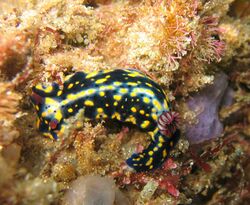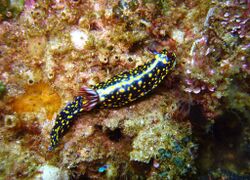Biology:Hypselodoris obscura
| Hypselodoris obscura | |
|---|---|

| |
| Scientific classification | |
| Domain: | Eukaryota |
| Kingdom: | Animalia |
| Phylum: | Mollusca |
| Class: | Gastropoda |
| Subclass: | Heterobranchia |
| Order: | Nudibranchia |
| Suborder: | Doridina |
| Superfamily: | Doridoidea |
| Family: | Chromodorididae |
| Genus: | Hypselodoris |
| Species: | H. obscura
|
| Binomial name | |
| Hypselodoris obscura (Stimpson, 1855)[1]
| |
| Synonyms | |
| |
Hypselodoris obscura is a species of colourful sea slug or dorid nudibranch, a marine gastropod mollusk in the family Chromodorididae.[3] It is the type species of the genus Hypselodoris.[1]
This species eats sponges.
Distribution
This nudibranch was described from Port Jackson, Australia . It is a warm temperate species only found in Southeastern Australia. It is related to the widespread tropical species Hypselodoris infucata and the similar Australian species Hypselodoris saintvincentia.[4]
Description
Hypselodoris obscura has a mottled appearance due to a grey or grey-blue background colour with yellow and black spots, which vary considerably in size between individuals. There is a paler stripe down the midline. The edge of the mantle is pale blue alternating with yellow. The gills and rhinophores are bright red.[4]
References
- ↑ 1.0 1.1 Stimpson, W. (1855). Descriptions of some new Marine Invertebrata Proceedings of the Academy of Natural Sciences. 7: 385-394.
- ↑ Angas, G. F. (1864). Description d´éspèces nouvelles appartenant à plusieurs genres de mollusques nudibranches des environs de Port-Jackson (Nouvelle-Galles du Sud), accompagnée de dessins faits d´après nature. Journal de Conchyliologie, series. 3(12): 43-70, pp. 54-55, Plate 5, Figure 1
- ↑ MolluscaBase (2018). Hypselodoris obscura (Stimpson, 1855). Accessed through: World Register of Marine Species on 2018-10-26
- ↑ 4.0 4.1 Rudman, W.B., 1998 (November 28) Hypselodoris obscura Stimpson, 1855. [In] Sea Slug Forum. Australian Museum, Sydney.
Wikidata ☰ Q2779009 entry
 |


